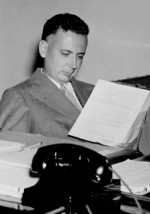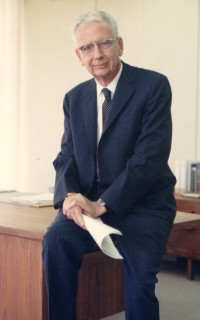| Arthur’s Philosophy excerpt from wikipedia.com Michael Collins Ph.D. & Jim Stitzinger authors |
|
|
Those who worked with Arthur Collins invariably mention his extraordinary work ethic, his penchant for long days and total concentration on fixed goals, and his expectation that others on his team should similarly put in long hours. He was skeptical of the concept of holidays, except perhaps for Christmas Day. Collins would ask his library assistant to compile books, journal articles and other select reading material. In a matter of only a few days these would be returned; he would by then have completely adsorbed their content, in preparation for the next phase of a project, and would then request a new batch. He did not welcome dissent, unless accompanied by facts and logical argument, yet he sought out expertise outside his background. One mathematician and personal friend noted that Collins once described how he could visualize new and revolutionary concepts. He described his ideas in such detail and correctness that the underlying math could then be generated by others and would seem obvious in retrospect. |
 Arthur devouring a working paper. |
 |
There is no doubt that part of the company’s success was due to Arthur Collins’ ability to seek out and recognize talented engineers and administrative staff. Collins Radio was known as a demanding workplace, but with the reward that absolutely cutting-edge work was being done. Probably his most significant personal trait was Collins’ ability to forecast society’s future technological needs, to then define goals and begin developing the systems and devices necessary to achieve these goals. In this way he anticipated a customer’s future needs, and would often have working models available well in advance of competitors. Examples would include the navigation aids and integrated flight control instruments build by Collins Radio following World War II, the binary modulation scheme of KINEPLEX and similar systems, SSB HF communication, and the melding of computers and communication - built on earlier work with telecommunication. Under Arthur Collins’ leadership Collins Radio devoted great resources to research and development and continually strove to advance the state of the art in concepts and technology, rather than producing consumer electronics with prolonged product lives and high income potential. The commercial aviation and defense electronic markets were inherently fickle and uncertain, often with relatively low profit margins, yet Collins Radio maintained its status as a premier company for four decades during Arthur Collins’ tenure. The consensus among his peers is that this longevity was due in large part to his imagination, vision, and genius for innovation. For an expert in communication, Arthur Collins was inherently shy and soft-spoken, comfortable in his authority without bluster. He had a rich sense of humor, fully expressed only in the company of close friends and associates. He avoided undue publicity, and extended this demeanor to his company by cautioning restraint in advertising and public relations. When the CBS anchor Walter Cronkite called asking for an interview during the Apollo landings, Collins demurred and told Cronkite that he didn’t want to take personal credit for the hard work of many others at Collins Radio. |
|
|
|